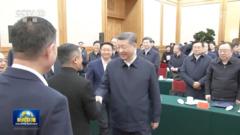Jack Ma's recent appearance at a high-profile meeting with Xi Jinping has sparked discussions about his "rehabilitation" and the future of China's tech industry. Experts suggest this could indicate a more favorable environment for private enterprises, potentially altering the trajectory of the nation's economic recovery.
Jack Ma's Resurgence: A Beacon of Hope for China's Tech Sector

Jack Ma's Resurgence: A Beacon of Hope for China's Tech Sector
The return of Alibaba founder Jack Ma signals potential policy shifts and renewed confidence in China's technology landscape amidst economic challenges.
Jack Ma, the enigmatic founder of Alibaba, has made a notable return to the public eye, attending a critical meeting with Chinese President Xi Jinping and other leading business figures. His presence has reignited discussions about the future of China's technology sector, which has been navigating tumultuous waters since his withdrawal from the spotlight in 2020. Critics have speculated that Ma's criticism of the financial sector may have contributed to a broader crackdown on tech firms, but his recent appearances are now being interpreted as a sign of policy re-evaluation.
The meeting, which brought together luminaries from diverse sectors, saw Ma seated in a prominent position, leading analysts to interpret his attendance as a signal of his rehabilitation. Following the event, Alibaba's shares saw an almost eight percent surge in New York trading, and they have increased by a whopping 60% since the start of the year, indicating a resurgence in confidence among investors.
In the wake of Ma's renewed visibility, social media users have voiced their support, hailing him as a vital force behind China's economic revitalization. Before stepping away from the public sphere, Ma had established himself as a crucial figure in the tech landscape, famously expressing concerns about state-owned banks during a 2020 financial panel, which resulted in significant repercussions for his businesses.
The question now arises whether Ma's reintegration could signal the end of stringent regulations that have plagued the tech industry. At the symposium where he reappeared, Xi emphasized the importance of innovation and confidence among private enterprises, suggesting the government's willingness to collaborate with these firms to navigate ongoing economic challenges.
Notably, this exploration of Ma's influence aligns with a broader observation; the recent introduction of China's disruptive AI model, DeepSeek's R1, has sparked immense national pride and financial growth. As investors look to the tech sector as a beacon of hope amidst urban uncertainty, speculations abound regarding how closely aligned China's private sector must remain with Xi's vision for national priorities, notably high-quality development with a focus on self-reliance in technology.
In this rapidly changing economic landscape, Ma's return hints at potential shifts that might invite greater autonomy for private innovators. Looking forward, experts posit that while room for growth exists, ensuring alignment with governmental objectives will be paramount.



















